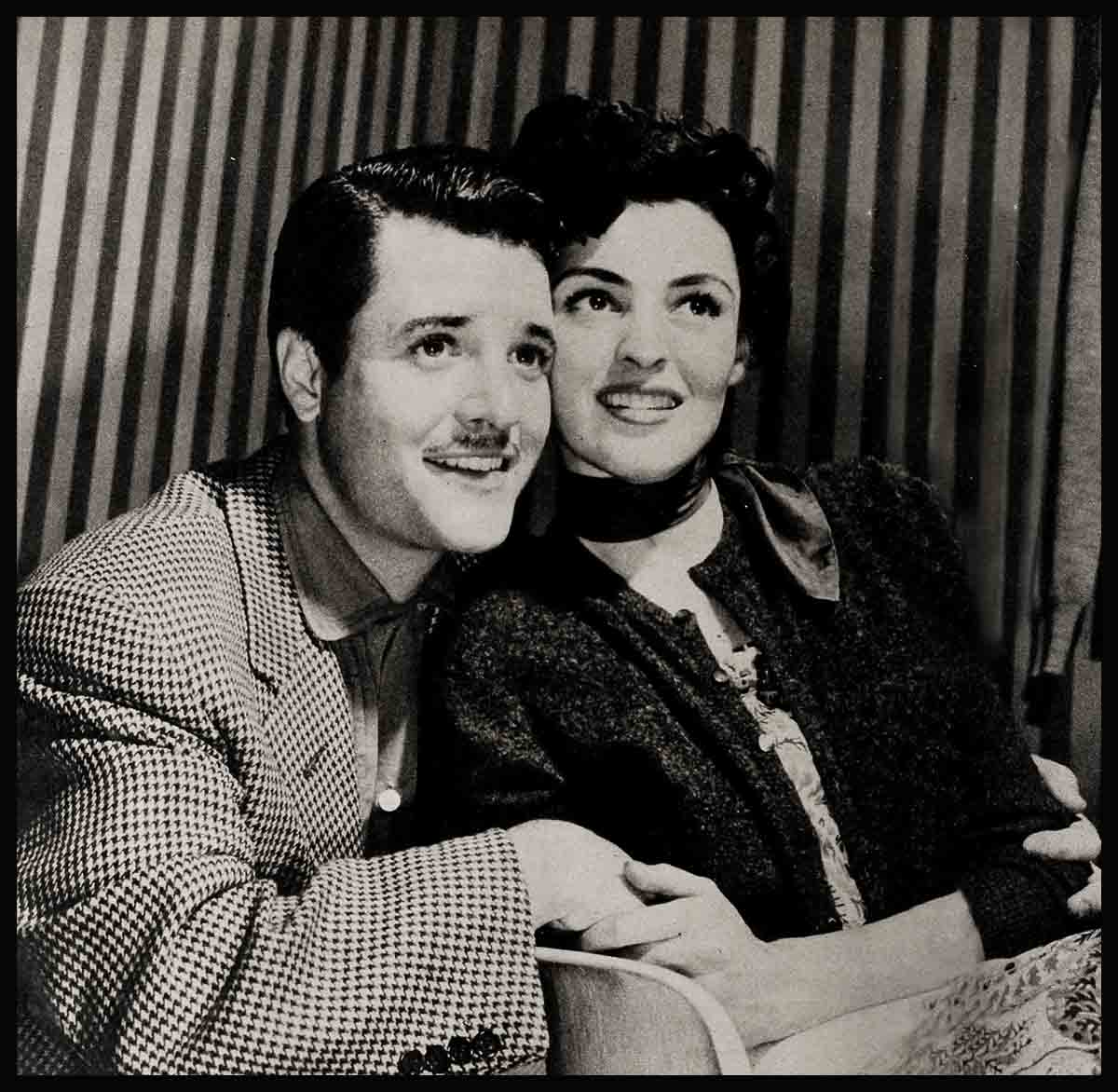
Give Her Mountains To Clim—Suzanne Ball
As Black Shawl in Universal’s Chief Crazy Horse, you’ll see Suzan walking straight and true into the arms of Vic Mature. After which, if you care to do her a service, forget she’s the girl who lost her leg. Think of her as she thinks of herself: Suzan Ball, working actress, and Suzan Long, cherished and cherishing wife to Dick.
“I won’t be able to leap fences, but I wasn’t doing much fence-leaping anyway. I can learn to ride horseback again. I’m already driving.”
“Neither more nor less dangerous,” comments her lord, “than other women, including the three-legged.”
Through his dry foolery the tenderness shows, free of mawkishness. Suzan is not mawkish either, merely aboveboard. “I’m sticking a sign on him: Attention All Girls! He’s Married!”
“And I’m sticking blinders on her.” Then he relents. “But very fancy blinders!”
If you’re listening for sobs beneath the surface, you’ll hear none. She’s a gipsy-faced beauty, her passion for life so intense that he calls her Tiger. He’s poised and mature, his reflective spirit deepened by two years in Korea. The past is past, the present and future are theirs. They teem with plans. “Mainly,” says Dick, “to live happily ever after.” As they tell the story, shifting from grave to gay, a picture emerges of two young people who found in each other the same will to accept reality, the same need for honest thinking, the same release in humor. They also found strength in love. But only because they had forged their own strength to build on.
Suzan, eighteen at the time, was undergoing deep-ray therapy for what she’d been told was a tumor of the knee. Little by little, suspicion took root. “People talk very strangely to me,” she told a close friend. “They call up and ‘say they’re praying for me. I want to know the truth. Do I have cancer?”
“No one can answer that except your doctor.”
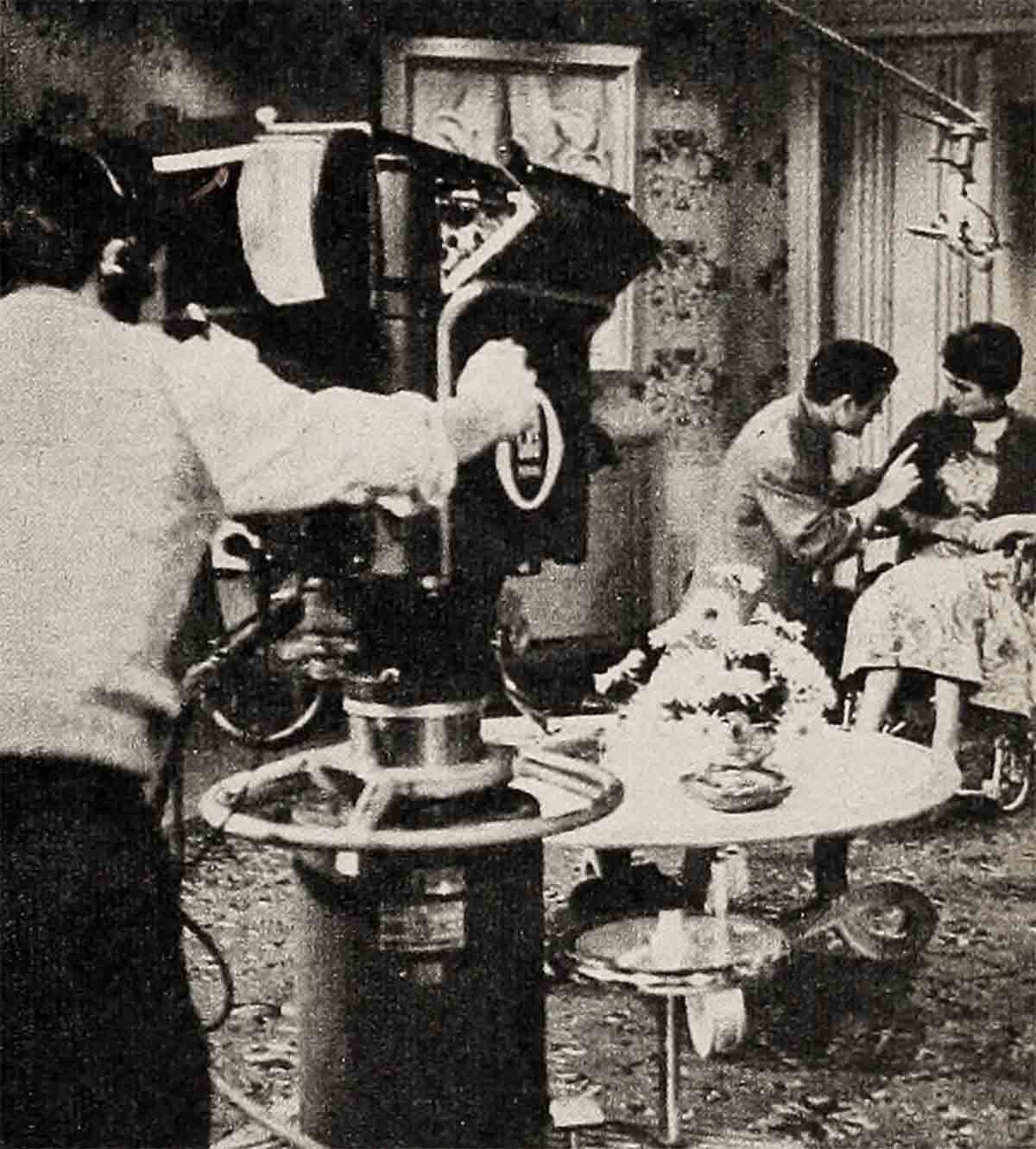
So she asked the doctor and after that she brushed evasions aside. If it was cancer, why pretend it was something else? But her nature turns toward the light. Fully aware of the connotations of her illness, she still refused to meet shadows halfway. “Given the choice between brooding or not, I don’t. It changes nothing.” Or, as Dick explained: “She’d rather escape into laughter than gloom. It’s a healthy instinct. In her darkest hour you could make her smile at a joke.”
During those months of treatment her smile seemed unforced and, swinging on crutches, she followed pleasant pursuits. Always self-reliant, she moved from the home of friends to her own apartment, furnished it with antiques inherited from her beloved grandmother. There her cronies gathered—Julia Adams, Mala Powers, Shelley Winters—and presently Dick Long, returned from war to resume his U-I contract. They fell in love.
Last October he asked her to marry him. With her heart crying yes, her lips said no and stuck to it. “It wouldn’t be fair. Not till I know about the leg.” Respecting her integrity, unwilling to complicate her problems, he agreed to shelve the question as unfinished business and continued to see her constantly. One day he came in to find her bubbling over an ad in the paper. “Poodles for sale! Let’s buy one.” They drove to the kennels and bought Cezanne who, in his clumsy innocence, proved the deus ex machina. Suzan slipped in a pool of water from his overturned bowl and broke the bad knee.
After three hours in surgery at Temple Hospital, she woke to find Dick bending over her. “Honey, they had to open your leg to set it. The tumor’s inactive. Everything’s going to be great. Will you marry The words rang like a peal of joyous bells. If Dick said it, it was true. Dick wouldn’t lie just to make her feel good for a minute. The leg was saved. She closed her eyes against the great tide of thanksgiving and opened them to smile at her love. Their engagement was announced from the hospital next day.
Dick had told her what the doctors told him. They had found the tumor inactive. By that miracle which happens once in ten thousand times, it seemed to have died. They would do a bone graft and within weeks Suzan would be walking on her own two legs. Thus ran the first reports.
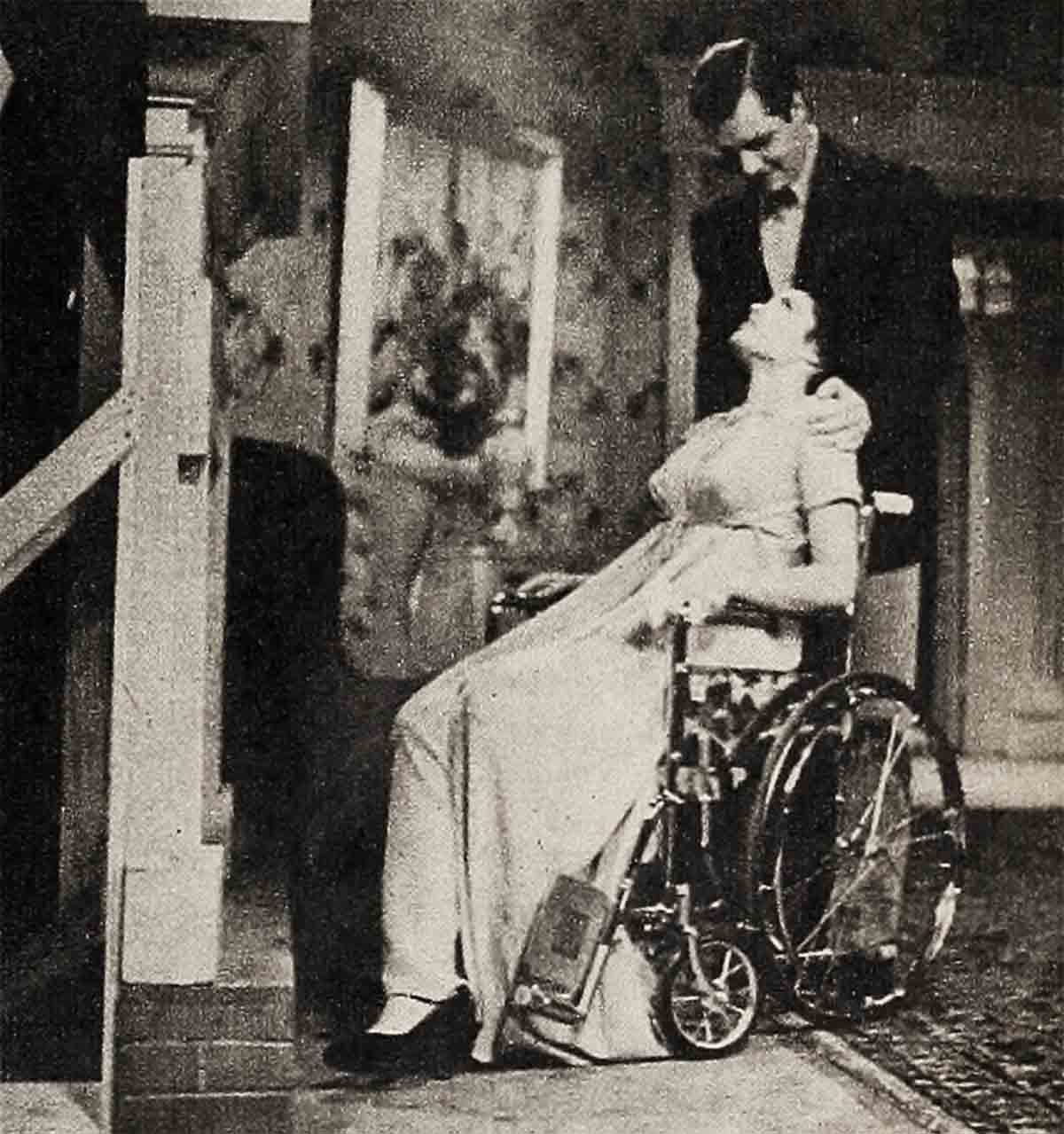
The second showed some divergence of opinion. Dr. Francis Engelman, newly called to the case, agreed that the signs were encouraging but refused to commit himself until he had gathered and examined material from all the other specialists and tissue from the leg had been further analyzed.
For two weeks Suzan lay in traction, spirits high, convinced that everything was going to be great, steadfastly ignoring any ominous alternative. Then Dr. Engelman had to walk in and perform the most agonizing job a good physician faces. The laboratory tests showed malignancy. The leg must be amputated. Dick stood beside her. Eyes huge in a face gone suddenly white, she broke the silence. “Maybe—there’s still a chance?” It was less a question than a desperately faltered plea.
“I’m sorry,” said the doctor.
She said she’d like to talk to the other doctors. The talks brought no comfort. She said she’d like to think for a while. A dismal rain dripped outside, matching the cheerlessness within. She stared through the window. This girl not yet out of her teens wrestled with the facts and at length reached her decision, fool-hardy and magnificent. “I won’t let them take my leg off. I’ll make myself well.” Advice fell on deaf ears. A resolve once taken, Suzan draws from some inner source the iron to stand firm. Against all sound opinion, against all odds, she determined to fight this battle out by herself.
“Little Miss Medical Association,” she scoffs now. “Doctors were idiots. I was the kid who’d show them.”
“She was dead wrong, of course. But,” added Dick, “what a show of pluck!”
Up to her neck in casts, she had herself transferred to a sanatorium. The experiment lasted a week, while Dick stood by leadenhearted and, for the first time in her life, Suzan lost weight steadily without trying. At eight one Saturday night Dr. Engelman came in with fresh reports, which showed rising infection. He spoke quietly, without mincing language. “I feel the deepest admiration for your spirit, Suzan. The mind can do tremendous things. But it can’t do this. Unless you agree to amputation, you’re committing suicide. Unless you allow me to operate, I’m leaving the case. I’ll be back for your answer in the morning.”
He die had been cast. Between your leg and your life, there is no choice. The room was very still. Into the stillness Dick dropped a gentle question. “Do you want to talk about it?”
“No.”
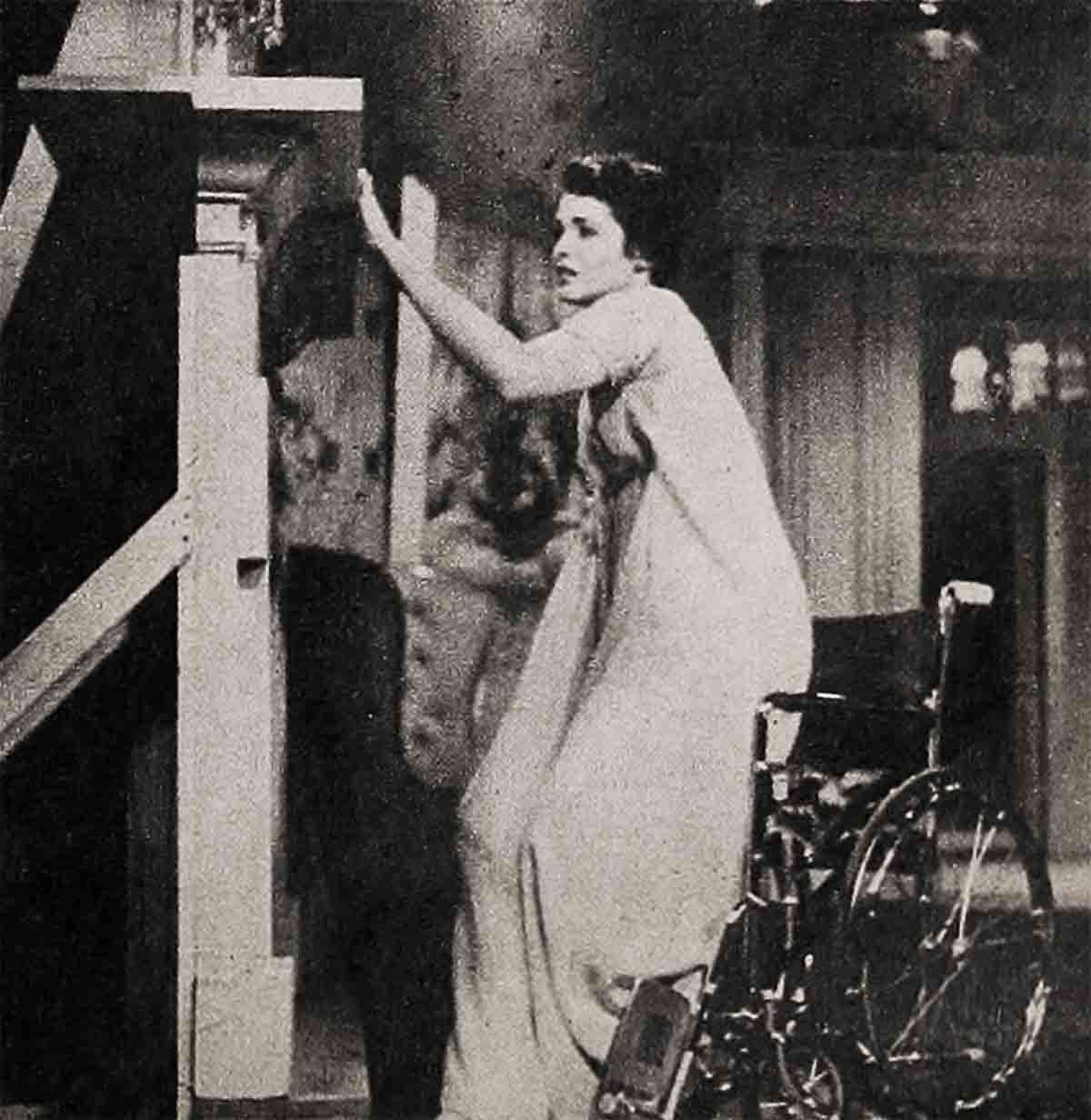
This he could certainly understand. “There are times when words are senseless and serve only to embroil you.” The scene that followed may have seemed strange to some people. It didn’t seem strange to Kay Biddle, Suzan’s nurse, who took one look at dark head and fair bent over a board, and withdrew. They were playing gin rummy. If terrors gathered, neither girl nor boy gave them voice. Through the deepening night and into the dawn, all you could hear was the slap of cards. At four, Kay broke it up.
Under sedatives, she slept for a few hours. Dick lay wide-eyed in a nearby room. When the doctor arrived, Suzan was ready for him. “All right, you can go ahead and operate.”
Within ten minutes she was whisked to the hospital. Dick stayed behind only long enough to pack. For two days they built her up with transfusions. On the third day they operated. Coming out of the fog, her eyes rested on Dick who had to stoop to catch the murmured words. “I’m going to get that artificial leg . . . and buy me a red, red dress . . . and walk into the studio and knock ’em dead . . .”
“Since when,” says Dick, “we’ve been on the merry road to happy ever after.”
Not quite, so far as Suzan was concerned. She had a piece of unfinished business pending. “It wouldn’t be fair,” she had told him months earlier. “Not till I know about the leg.” Well, now she knew and now she gave him every chance to depart in good grace. He laughed the outrageous suggestion off, but that wasn’t the answer. He grew angry at last, but that wasn’t the answer either. Her smoky eyes held his. “Look at it my way, Dick. Put yourself in my place.”
There he found the answer. “I’ll do that, honey, and you put yourself in mine. Suppose I’d lost a leg. Would you love me any less?”
“More,” she was bound to admit, against his tweed shoulder. Which settled that.
Three factors sped her amazingly rapid recovery. Dick’s singleminded devotion. own valor and sanity. She’d have no truck with invalidism, in which course the doctor egged her on. If she wanted a crew of chattering kids around, he said, “The more, the merrier.” If she craved a hamburger instead of hospital fare, he said, “Let her eat what she likes; it’ll do her good.” With Dick, it wasn’t a matter of dropping in to see her. Except for two days on Playgirl or a necessary errand, he never left her. She neither dragged in nor avoided mention of her leg, no more self-conscious than if it had been an appendix. Reporters clamored for interviews. In rosy bedjacket over a black gown, she received them exactly one week after surgery.
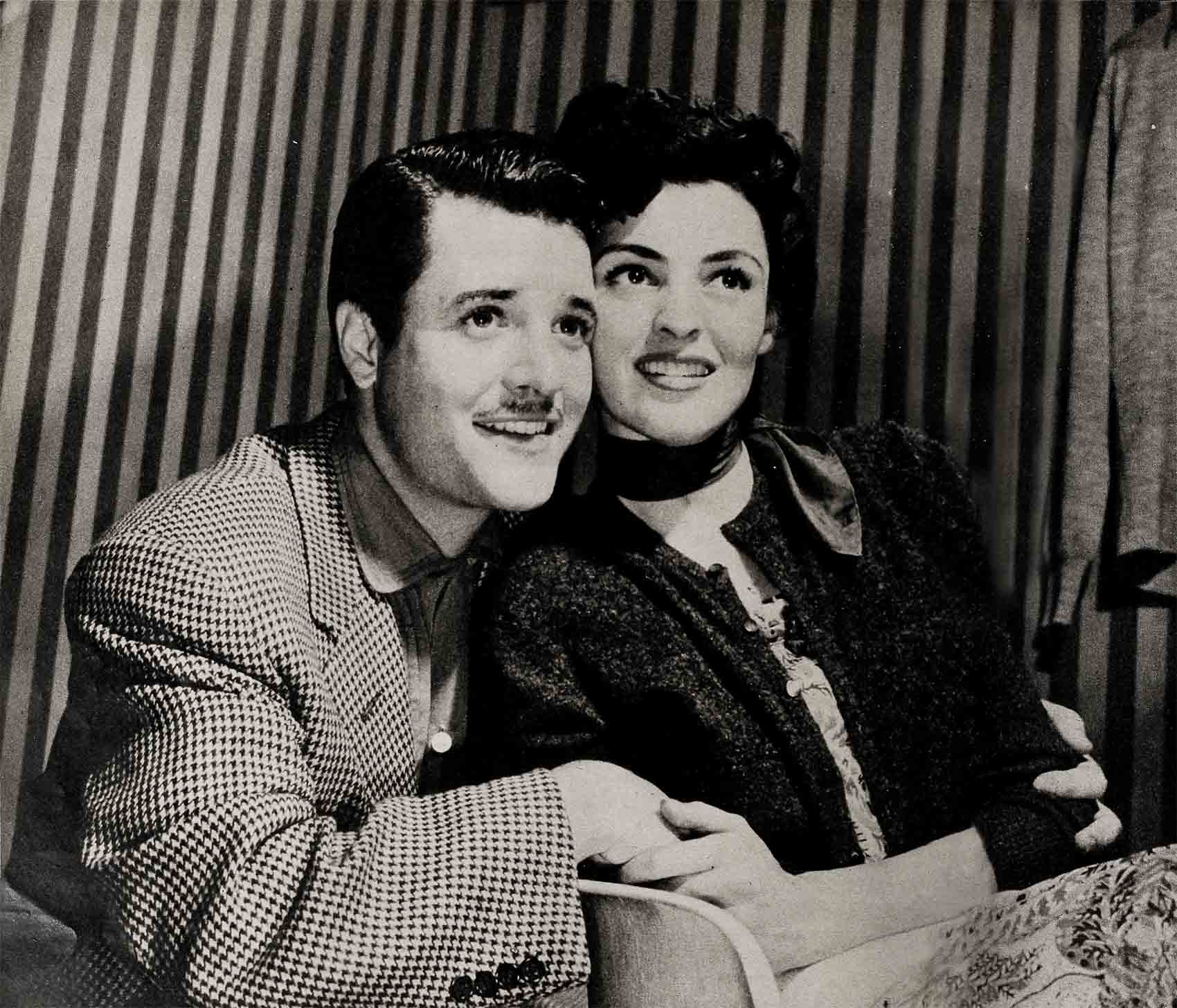
“Nobody wants to lose a leg or his eyesight or even his teeth. It’s an inconvenience. But if you’re asking me if I feel sorry for myself, the answer is no. In return for my leg, I’ve been given my life. That’s a pretty wonderful exchange, and I’m about to enjoy every minute of it.”
She glowed over letters from war amputees and others. “At first you’re a little uncertain. You wonder how it’s going to look and feel. These kind people told me how easily they’d adjusted, how normally they lived. Suddenly I had a whole new i world of friends. They gave me not only an emotional lift, but practical help. I’m forever indebted to them.”
“And to my studio, which spared no expense in taking care of me. I didn’t have to worry about the money. One of the few times I cried was when they told me and wouldn’t even let me say thanks. They can’t prevent me from saying it now in print.”
Toward the end of February she went home with Kay, bent on a triple goal. To walk again, to become Mrs, Richard Long, to go back to work—in that order. Once the prosthetic leg had been made and mastered, they’d set the date. But that process takes weeks, often months. “We’re in love,” Dick pointed out. “We should be together. What are we waiting for?”
“So your bride can walk down the aisle.”
“Does it matter, Suzan?”
“Since you put it that way, no.”
They picked April 11 as the day, Santa Barbara as the place. They drove up and down house-hunting, but the rents were awful. “How about staying here?” Suzan waved an airy arm around her modest apartment. “Save all that beautiful money for the beautiful time when we can buy or build.”
“A tent suits me,” said Dick, “as long as you’re in it.”
They got busy at U-I, too. Bill Thomas came over and laid a sketch before her. It showed a bride in a floor-length gown of rose-point lace over ruffled petticoats of palest pink chiffon and a peach satin underslip. Empire sleeves billowed to the elbow, tapered to the wrist, delicate embroidery traced the neckline. A tulle veil, hand-appliquéd with matching lace, flowed from a tiny coronet. Each detail had been wrought by Thomas with exquisite care to set off Suzan’s slender dark loveliness. She looked from the sketch to him, from him to the sketch and struggled for words. “Oh Bill, oh Bill—”
He cleared his throat. “Any changes? Speak now, or forever hold your peace.”
Her head went down on the drawing. “I’m so happy,” she wept.
Nor did it sadden her when, among other preparations, she found them wrapping a pair of crutches in white satin. “I just think it’s silly. You’re wasting your good time. I’m going to walk.” They reasoned, cajoled, bullied. “You’ll have all that froufrou around your feet. Even on two sound legs, it’s a nervous business. Fine thing if you tripped. Please, please Suzie, forget it.”
Six days before her wedding, the artificial leg was delivered—only a practice leg at that. Painfully, doggedly, she began trying it out. Three evenings later Dr. Engelman called to say he wanted to come by with a wedding gift. “I’m going to meet him at the door,” said Suzan. By a heroic effort, Kay kept her mouth shut. Torn between admiration and dread, she watched the tortured progress across the room, heard the breath drawn in gasps, saw the perspiration break. But when the bell rang, Suzan was at the door. “Hello, doctor, how are you?” she said, and fell against his chest.
He helped her to the couch. “That was swell, Suzan. But your wedding’s three days off. Better use the crutches.”
From the swelling chorus of protest, only one voice was absent. Dick knew what lay behind Suzan’s insistence. It was neither pride nor stubbornness, but her love for him. He never had seen her walk. She had been on crutches when they met. Walking into wifehood would be a kind of symbol, a gift and pledge to him, another of those things that you can’t put into words without getting embroiled. Dick said, “It’s up to Suzan. If she thinks she can make it, there’s no reason why she shouldn’t.”
Five tiers of tall pink candles flickered softly above the oaken altar of El Montecito Presbyterian Church. Two hundred guests rustled—and quieted as the Reverend Paul Gammons took his place, followed by Dick and his brother Philip. The groom looked self-possessed, but probably his pulse could have been registered on a seismograph. Whether Suzan would walk or not was still uncertain. Studio spokesmen said no. Even Dick wasn’t sure. She might have turned jittery or let the judgment of others prevail.
The first notes of “Lohengrin” brought Kay, matron of honor, into view. Then the doorway framed Suzan on her father’s arm. Without crutches, with the barest trace of a limp, she came down the aisle, luminous face turned toward the altar and Dick. A great sigh rose from the guests. All such moments are touched with mystic solemnity. This one held more. It crowned the affirmation of faith over fear, of courage over darkness—the soaring triumph of life and love over death. It humbled and lifted the hearts of all who bore witness.
She placed her hand in his. The brief ceremony started. “What token of your love do you give?” The rings were offered. “These are precious metal, symbolizing the quality of your love.” Each slipped a ring over the other’s finger. “I now pronounce you man and wife, joining your gallantry, Suzan, with your devotion, Richard, as long as you both shall live.”
Her head went up, tossing the veil aside. Their lips met. On her husband’s arm she walked back.
“I always knew I’d be married without crutches,” she cried.
“My spine,” said Dick, “was jelly until I saw her coming. Then it stiffened with pride.”
Her third objective was to get back into harness. Only on that score did she ever fret. “If I can’t work again, I’m not going to be happy.” Six weeks after their marriage she and Dick appeared together on TV for Lux. Suzan played a girl whose husband’s death had tied her psychotically to a wheelchair. Dick played the doctor who needled her to her feet.
The chair angle didn’t appeal to her at all. “I’d rather do something that shows me dancing at Ciro’s. I don’t want to stress the loss of my leg.” On the other hand, she’d be working, and working with Dick. Besides, she’d walk at the end.
“This hypoed me,” she laughs. “It was like a deadline. They had taken my practice leg away. The permanent one wasn’t even ready yet. You think you have three months to learn, then suddenly you’ve got to walk. So you do.”
It wasn’t that simple. The first try had been for Dick and 200 friends. This would be for millions. Frankly scared, Suzan played a small trick on herself. Rising to her feet, she hung on to one thought. “This is a movie,” she pretended. “If I stumble, they’ll just cut the scene and do it over again.” She made it like a breeze.
Next day the studio called with the topper. “Any girl who can do live tv can make a picture. We’re sending you to the Black Hills of South Dakota. To be an Indian with Mature and Lund. On one condition. If it’s okay with the doctor.”
“On one condition,” echoed Suzan joyously. “Give me mountains to climb.”
At home they have fun doing nothing much. Dick painted a bedroom wall, paused for two weeks, and clambered out one fine midnight to tackle the second.
“Why?” asked his wife drowsily.
“Inspiration,” he explained.
She found this reasonable. “I used to have to scrub the kitchen floor on Saturdays. So I’d gambol in from a Friday night date at twelve and scrub it then.”
“What were you doing out until twelve?”
“Twelve isn’t very late and besides, it’s none of your business. I wasn’t married to you then.”
“You’ve got a point,” he conceded, and went on painting. She went back to sleep, being an early riser. Dick fails to share her ardor for activity at six and insists that she drags him out of bed by brute force. Once out, he likes it. They drive through the fresh morning into the country where a curious thing happens. Inevitably, at gas station or coffee shop, they met some boy Suzan went to school with.
“Must have been a terribly large school,” comments her husband.
“Average,” Suzan assures him primly.
Nights, they mostly stay home. When Dick turns on the fights, Suzan escapes to the TV in the bedroom. “Come out!” he yells. “You’re missing the battle of the ages.” To her all fights look alike—a couple of guys pasting each other. But she indulges the male till he’s engrossed again, then sneaks back to her own program. Or they go to a drive-in theatre, where she falls asleep and never sees more than fifty per cent of the picture. “I’m trying to get her in half-fare,” says Dick.
As a cook, she works by flair rather than book. Uninhibited, Dick calls her, though never dull. “Dumps shelves of stuff into everything, don’t ask her why, and it turns out deliciously.” The first time his folks came to dinner, they set and re-set the table nine times before it seemed worthy of the banquet Suzan prepared. Now they haul out the TV tables and toss a salad.
In today, their dreams for tomorrow include a house in the hills, where it’s quiet enough to hear the birds sing. Dick’s only other requirement is a king-size bed. “So I won’t be kicking him all the time,” says Suzan. “Me, I need fireplaces in every room.”
“Mr. and Mrs. Richard Long,” he muses. “At home in a barbecue pit.”
Their dreams include children, but not yet. “Suzan is only twenty. I don’t think she should take that responsibility now. We have things to do—like seeing Europe together, like working together in pictures or on the stage. We both feel strongly that a mother should dedicate herself to her children. The time comes when you’re ready. We’ll wait until then.”
One wonders where two people so young gleaned all their wisdom. One feels that, hand in hand with Dick, Suzan has climbed her mountain and won the top, where the view spreads wide. It’s a view rich with the sweetness and splendor of life. Unlike most of us, she’ll never take it for granted.
THE END
—BY IDA ZEITLIN
It is a quote. MODERN SCREEN MAGAZINE SEPTEMBER 1954





No Comments